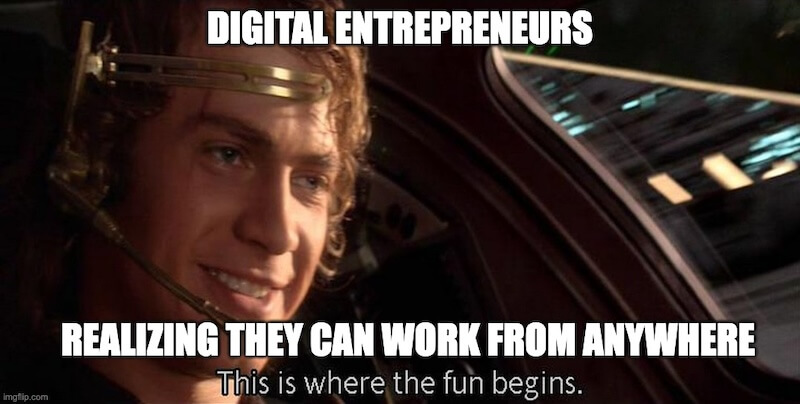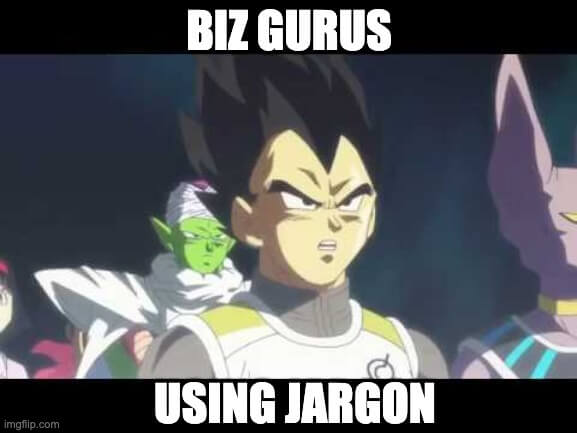If you want to jump straight to the 5 questions, go here.

The business world has changed so much in the last 10 years. With the rise of the internet, a new kind of entrepreneur has emerged: digital entrepreneurs.
They are using online platforms to build businesses that are flexible, scalable and can be run from anywhere in the world. If you’ve ever wanted to start your own online business, this will walk you through it all.

What is a Digital Entrepreneur?
A digital entrepreneur is someone who runs their business entirely online. Unlike traditional entrepreneurs, they don’t need a physical shop or office. Instead they use the internet to sell services, digital products or even physical products.
The beauty of digital entrepreneurship is the flexibility. You can work from anywhere – your home, a coffee shop or a beach half way around the world. And often starting an online business requires less funding than a traditional business.

Types of Digital Entrepreneurs
Here are a few types of digital entrepreneurs:
Bloggers
These folks create written content around a niche topic and usually monetize via ads or affiliate marketing. Some of them sell their own products and/or services too.
Podcasters
These are people who use the power of storytelling to attract listeners and connect with them on a deeper level. They talk about a certain topic, drawing from their own expertise. Many also invite guest speakers on their show.
Income is earned through sponsorships or selling affiliate offers.
YouTubers
These folks create video content and monetize via sponsorships, YouTube ads (a.k.a. AdSense), or selling other people’s products and/or services.
The videos created are usually both entertaining and educational. The “entertainment” part is a given — considering how hard it is to hold people’s attention these days.
Influencers
Influencers are like “mini celebrities”. They usually have a large following on social media platforms like Instagram, TikTok, YouTube, X, LinkedIn, etc.
Apart from posting about the products / services they promote, they also share their expertise related to the niche they’re in.
Examples:
A fitness expert sharing workout tips
A food enthusiast posting her recipe
A long-distance runner holding a Q&A session on Facebook live answering questions how to prepare for a marathon
E-commerce Sellers
This group of people sell physical products / merchandise — usually through platforms like Shopify or Etsy. They often capitalize on the current online shopping trend to move their goods.
Course Creators
These folks are experts in their own domain. Their expertise can solve other people’s problems. So they leverage their skills and create self-help courses. They then sell the courses to people looking for a solution to their problems.
E.g. A public speaking expert selling online courses to people looking to improve their public speaking skills.
Consultants and Freelancers:
These are people who offer services like programming, design, writing, social media management, marketing, video creation, video editing, etc.
They are good at what they do and by offering their expertise “for sale” to businesses that need them, they can earn a good income. And the best thing? They can do their work remotely.
No one type is better than the other. Each has its own pros and cons. Choose one that suits you. For example, if you like to write, blogging can be for you. If you hate writing and love creating videos, YouTubing could be a better fit for you.
Why Become a Digital Entrepreneur
Flexibility
Work from anywhere at any time. Digital entrepreneurs get to design their own work environment, whether it’s a home office or a co-working space. This freedom gives them a better work-life balance and the ability to adjust business hours to their personal preferences.
Scalability
Reach a global audience without borders. Digital businesses can grow fast by tapping into international markets, so entrepreneurs can grow their customer base exponentially. With the right marketing and digital tools scaling your business online is easier than ever.
Low Startup Costs
Many online businesses require little to no upfront investment. Unlike traditional businesses that often need a lot of capital for a physical location or inventory, digital entrepreneurs can start with a laptop and an internet connection. This low barrier to entry is especially appealing to small business owners looking to test new business ideas.
Profitability
With low overheads digital businesses can be very profitable. By eliminating expenses like rent and utilities of a physical presence digital entrepreneurs can focus on high margin profits. And digital products and services online offer opportunities for passive income streams to boot.
Think of having the ability to set your own schedule while having a business that reaches customers globally.

That’s the power of digital entrepreneurship.
The digital space is full of opportunities and personal growth so it’s a great option for those who want to be their own boss and have a digital business that aligns with their passions and goals.
Starting a Digital Business
Starting an online business can seem overwhelming but breaking it down into steps makes it doable.
1/ Your Niche and Business Idea
Every business starts with solving a problem. Ask yourself:
What problems can I solve?
What’s my unique angle?
Research your target market to understand their needs and pain points. This will help you find a niche where you can position yourself.
Do market research to check the competition and see if there’s demand for your business idea. Use digital tools to trend and gather data to understand customer behavior. This is critical to make sure your business idea meets market needs and has room to grow.
2/ Business Plan and Goals
A business plan is your roadmap. Outline:
Your goals (use SMART goals: Specific, Measurable, Achievable, Relevant, Time-bound).
Your target market.
Your marketing strategy.
Make sure to have clear goals before you even start. After you start, track your progress so that you know if you’re moving in the right direction or not. Correct course if not.
A business plan is also important: pricing, projected income and expenses, what product or service you’re going to offer, what you’re going to do to attract customers / clients.
3/ Your Brand and Online Presence
Design an appropriate logo and build a consistent personal brand throughout all social media profiles. If you don’t know how to design, there are plenty of affordable yet good designers on Fiverr you can hire.
Regularly engage your audience with useful content. By useful, I mean content that actually solves some of their problems, not fluffy content that’s not relevant.
Use SEO (Search Engine Optimization) to get traffic from Google and increase website visibility. If you have more budget than time, you can outsource this to a professional.
Traits and Skills of a Digital Entrepreneur
The word “passion” is overrated. Many people say all you need is just passion. Sorry to pour cold water on you, but it doesn’t work that way.
You need certain traits and skills.
Traits
Adaptability
In the cutthroat world of business, if you can’t adapt your business will go bankrupt. Always monitor what the market is telling you and adjust accordingly.
Resilience
With anything — especially business — challenges are inevitable. It’s how we respond to them that will determine our long-term success.
The sooner you accept that struggles and problems will appear, the better. Because it’s not a matter of if, it’s a matter of when.
Creativity
There are many ways to skin a cat. When you encounter a problem, think out of the box and come up with creative ways to solve it. Try to look at the problem from a different perspective.
Skills
Marketing
The best product or service in the world is useless if no one knows of its existence. That’s why the marketing or promotion of the said product / service as as important — if not more important — than the product / service itself.
There are many ways to do marketing. Social media campaigns, email marketing, SEO, paid ads, etc. There’s no need to do all of them at once. Pick one first to get started so you don’t get overwhelmed. You can always add another channel in the future.
Technology
Use tools, apps, software to help you with your tasks. Some examples are:
Website / landing page builders to build your website or landing page (e.g. WordPress or Webflow)
Analytics to track your performance (e.g. Google Analytics)
Email marketing tools to build an email list and constantly stay in touch with them via emails (e.g. BirdSend)
Leadership
Strong leadership skills will enable you to motivate your teammates to do the best job they can. Plus, in this day and age where everything is done online (i.e. your teammates may not even have met each other in real life) — the ability to bring them together and encourage them to collaborate is even more important than ever.
Communication
Miscommunication in the workplace costs businesses over $2 trillion annually. So make sure to communicate clearly instead of beating around the bush. Use simple language that everyone can understand (read: using jargon is mehhh).

Continuous Improvement
The business world moves super fast. If you can’t keep up, you’ll be left behind.
Make sure to stay up to date with trends and technologies by taking courses or webinars or attending industry conferences. Always keep an eye on what customers are telling you too (i.e. their constructive feedback).
Take what makes sense and improve your offerings on a continuous basis.
Digital Marketing and Promotion
As I’ve stated, it’s no use having the best offer (product / service) in the world but no one knows about it. That’s why marketing is the lifeblood of any business.
But why digital marketing instead of regular “marketing”?
Because digital marketing allows you to reach potential customers all over the world. There will be no more boundaries or “oh you’re too far away for me to buy” excuse. Plus, the delivery of the offer is done online, at the comfort of one’s own home.
Next I want to talk about the importance of online communities. If you can build a loyal following and position yourself as the leader, online communities can be a lucrative source of acquiring clients and customers.
A loyal community not only supports your business but also becomes advocates for your brand. Encourage user generated content and testimonials to get more reach and credibility as happy customers share their experience with others.
By building a strong online community digital entrepreneurs can create a network of brand ambassadors who will contribute to long term business success.
Here are 2 community building tips:
Responding to comments on social media
Engaging with your audience builds community and loyalty. By responding to comments and feedback quickly digital entrepreneurs can show they care about customer satisfaction and build trust.
Hosting live Q&A or webinars.
Live interactions give digital entrepreneurs the opportunity to connect with their audience in real time and share valuable insights and build a deeper connection. By hosting webinars and Q&A’s businesses can show case their expertise and answer customer questions and build their brand authority.
Growing Your Digital Business
Once you’ve got momentum, consider growing even further.
This requires strategic planning and execution. You can’t just “wing it” and pray for the best. You need to really understand your customers’ pain points and problems like the back of your hand.
Only then can you deliver a great solution and get paid handsomely for it.
1/ How to Grow
Create new offerings (go deep)
There will always be gaps in your market. Research what other relevant problems you can solve for your target audience. This will attract a wider audience.
Then create complementary offers to fill these gaps. Be sure to add one offer a time. Don’t be greedy.

Partner with other non-competing businesses that serve your target audience
This means cross-promoting each other’s offers.
E.g.
You’re a fitness coach
You partner with a sports apparel company
You give discounts to customers who bought from the apparel company
The apparel company gives discounts to your customers
2/ Technology
Use tools like automation software to save time and increase efficiency. Technology is key to scaling your digital business. Automation can automate repetitive tasks so you can focus on strategic and creative work.
Email automation tools (e.g. BirdSend, Mailchimp). Automated email campaigns can nurture leads and keep in touch with your audience. Personalize email content based on user behavior and preferences to increase conversions and customer loyalty.
Project management platforms (e.g. Trello). Good project management is key to coordinating tasks, tracking progress and working with remote teams. Use digital tools to assign tasks, set deadlines and monitor performance so your business runs smoothly.
Consider using customer relationship management (CRM) systems to manage interactions with potential and existing customers. CRM tools can give you valuable insights into customer behavior so you can tailor your marketing and improve customer satisfaction.
3/ Performance
Track metrics like website traffic or conversion rates using analytics tools (e.g. Google Analytics). Data driven decisions will give you better results over time. Monitoring your key performance indicators (KPIs) will allow you to measure the effectiveness of your marketing and identify areas to improve.
Analyze data regularly to understand customer preferences, identify trends and optimise your digital marketing. Use A/B testing to test different marketing approaches and see what works best with your audience.
In addition to quantitative metrics consider gathering qualitative feedback from your customers through surveys or reviews. Understanding their experiences and pain points will give you valuable insights to refine your offerings and increase customer satisfaction.
By scaling your digital business holistically you can navigate challenges, grab opportunities and achieve long term growth in the ever changing digital world. Remember successful digital entrepreneurs adapt to changes, innovate and deliver value to their customers.
Real Entrepreneurs Who’ve Succeeded
1/ Fernando Raymond (SeekaHost & ClickDo)
Fernando was an SEO consultant before founding ClickDo, a top London based digital marketing agency and SeekaHost, a web hosting company for beginners. By 2020 his businesses were generating 6 figures while running independently thanks to teams managing daily operations.
2/ Melanie Perkins (Canva)
Melanie co-founded Canva in 2013 after seeing how hard graphic design tools were for beginners. Despite 100+ investor rejections initially Canva is now valued at $40 billion (2023) one of the most successful startups in the world!
3/ Iman Gadzhi (GrowYourAgency)
Iman dropped out of school at 17 to start his digital marketing agency. Through GrowYourAgency, he has helped others scale their agencies and generated over $30 million in revenue himself—a true proof of persistence and innovation.
The 5 Questions Digital Entrepreneurs Must Answer Before Choosing Their Next Venture
1/ What skills or expertise do I already have?
Think about your strengths and knowledge. For example if you’re good at writing blogging might be a good fit. If you’re good at public speaking or storytelling podcasting or YouTube could be ideal.
Leverage what you already know will give you a solid foundation to start with, reduce the learning curve and increase your chances of success. Also think about any unique experiences or insights you can bring to your niche, that will set you apart from the competition.
2/ What problems can I solve for others?
Find out the pain points of your target audience. If you can solve a specific problem, whether it’s teaching a skill or providing a product they need you’ll have a solid foundation for your business.
Do your market research to uncover unmet needs and gaps in the market and tailor your offerings to provide maximum value. The more you can solve for your audience the more likely you’ll build a loyal customer base.
3/ Don’t solely go after your “passion”
Many folks say to go after your passion. I respectfully disagree.
The correct advice should be: Consider your passion, but don’t put it front and center when deciding the type of business model / niche to go after.
The above 2 points — your skills + problems you can solve for others are much more important than your “passion”. Consider them first, only then you can add passion into the equation.
E.g. Say my passion is movies, but it doesn’t mean I have the skills and resources to run a movie theater or produce films.
4/ How much time and money can I put in?
Some digital entrepreneurship’s like e-commerce require upfront investment in inventory and logistics. Others like freelancing or consulting only require your time and expertise. Be realistic about the time and resources you can put in your business and this will dictate your business model.
Start small and scale as you gain experience and resources so you can manage the risk and learn from the initial challenges.
5/ Who do I want to reach?
Who do you want to serve—whether it’s a global audience for an online course or a niche community for a blog. Knowing your ideal customer will help you decide which type of business to be.
Creating a detailed customer persona will guide your marketing and content creation so you resonate with your audience. Tailor your message and offerings to their needs and preferences to increase engagement and business success.
6/ What are my long term goals?
Do you want to build a business that can scale and generate passive income like selling courses or running an e-commerce store? Or do you want to offer personalized services as a consultant or freelancer? Your goals will decide.
Think about how each type of digital entrepreneurship fits with your vision for the future, including your work-life balance, income and personal fulfillment. Setting clear and achievable goals will give you direction and motivation as you start your entrepreneurial journey.
These questions will help you match your passions, skills and resources with the right digital entrepreneurship for you!
Wrapping Up
Digital entrepreneurship is open to anyone who’s willing to take the first step. Whether you want flexibility, scalability or financial freedom, starting an online business is your way forward.
Get inspired by Fernando Raymond, Melanie Perkins and Iman Gadzhi and start building yours today.
Related
- Sellfy vs Easy Digital Downloads: the revenue hostage (2026)
- SendOwl vs Easy Digital Downloads: the revenue prison (2026)
- SamCart vs Easy Digital Downloads: the revenue trap (2026)
- Easy Digital Downloads vs Payhip: the revenue ransom (2026 )
- Easy Digital Downloads vs Gumroad: the income handcuffs (2026)
- Easy Digital Downloads vs SureCart: the revenue hostage (2026)
- SureCart alternative: the revenue trap no one mentions (2026)
- 8 Ejunkie alternatives: the cart stuck in 2009 (2026)
- Easy Digital Downloads vs ThriveCart: the piracy problem (2026)
- Sellfy alternative: escape the revenue lockout (2026)
